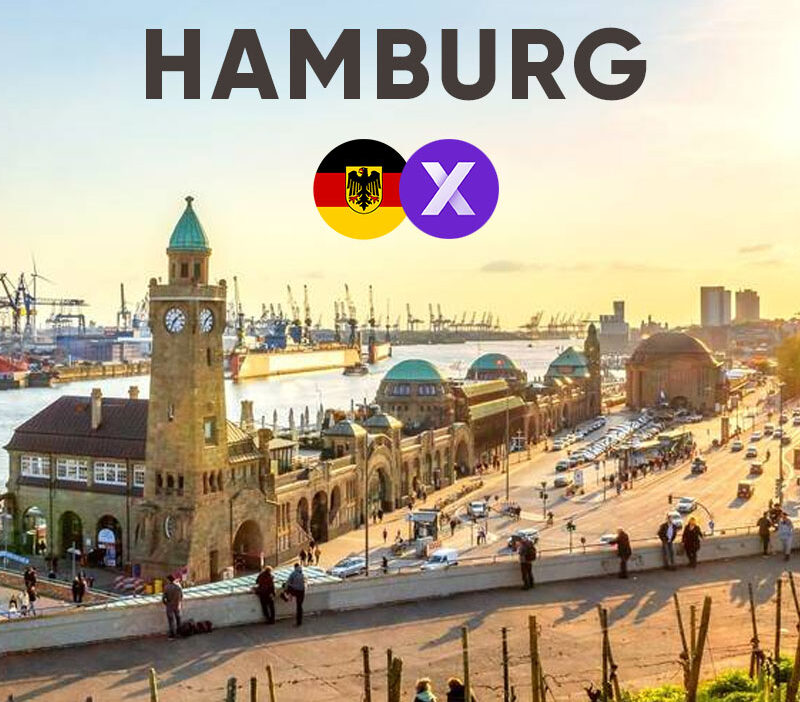Moving to Hamburg means embracing Germany’s second-largest city — a port hub with serious charm and quality of life.
If Berlin is Germany’s rebel and Munich its perfectionist, Hamburg is the elegant middle child — confident, green, and quietly wealthy. This northern port city blends business with nature, history with modernity, and gives you space to breathe.
With its lakes, canals, and understated energy, Hamburg is ideal for long-term life — especially for those who prefer parks and quiet cafés to chaos and crowds.
Key Facts About Hamburg (Germany)
| Parameter | Value |
|---|---|
| Population | ~1.9 million (city), ~5 million (metro area) |
| Language | German (official), English widely understood among youth |
| Currency | Euro (EUR) |
| Average Rent | €1,200–2,000/month (1-bedroom in good neighborhood) |
| Average Net Salary | €2,800–3,800/month |
| Digital Nomad Budget | €2,500–4,500/month |
| Health Insurance | Mandatory (public/private) – from €250/month |
| Safety Level | High – very safe in residential areas |
| Public Transport | U-Bahn, S-Bahn, bus, ferry (~€110/month for pass) |
| Climate | Maritime – cool summers, mild winters, rain and wind |
| Residence Permit / Long Stay | Work, study, Blue Card, freelance, family reunification |
| Education | University of Hamburg, international schools |
| Grocery Prices | Moderate – Rewe, Lidl, Edeka, Aldi |
| Access to Nature | Lakes, parks, Elbe river, North/Baltic Sea nearby |
| City Atmosphere | Calm, professional, creative, water-centric |
Renting in Hamburg: More Space, Less Stress
Compared to Berlin or Munich, Hamburg’s housing market is less frantic, especially outside the city center. The quality of housing is high, and neighborhoods vary from stately to alternative.
Average monthly rent in 2025:
- 1-bedroom near Sternschanze or Eimsbüttel: €1,100–1,400
- 2-bedroom in Winterhude or Altona: €1,500–1,900
- Studio in central Hamburg: €900–1,200
- Utilities: €200–300/month
- Deposit: Usually 2–3 months’ rent
Looking ahead? Check long-term rentals in Hamburg on XMetr.
Visas and Residency: Germany Has Clear Paths
Germany has a structured and transparent immigration system. Whether you’re coming for work, study, or family, residency is very possible — especially for skilled professionals.
Main visa categories:
- EU Blue Card – for university-educated professionals
- Freelance Visa – for creatives, IT, consultants
- Student Visa – with part-time work rights
- Family Reunification Visa
- Job-Seeker Visa – for six-month job hunting
Permanent residency usually becomes available after 5 years — or even sooner with a Blue Card.
Language and Daily Life
Hamburg is international, but German is still essential for paperwork, doctors, and deeper integration. Many expats take evening courses or attend Volkshochschule (community colleges) to improve their skills.
Still, in sectors like tech, media, or academia, you can survive — and even thrive — in English. Locals are reserved but polite, and Hamburg is one of the safest big cities in Germany.
Where to Live in Hamburg
- Eimsbüttel – relaxed, leafy, great for young professionals
- Sternschanze – hip, bohemian, full of nightlife
- Altona – residential, near the river, multicultural
- Winterhude – family-friendly, parks, elegant buildings
- St. Pauli – lively, edgy, near the Reeperbahn
- Barmbek & Wandsbek – more affordable, still central
- Harburg – student-friendly and well-connected via S-Bahn
Most neighborhoods are bikeable and served by efficient public transport.
Top 5 Best Neighborhoods in Hamburg for Long-Term Living
| Neighborhood | Why It’s Great |
|---|---|
| 1. Eimsbüttel | Lively, full of cafés and parks, popular with students and young professionals. |
| 2. Ottensen | Artistic, close to the Elbe, great restaurants and culture. |
| 3. Winterhude | Leafy, canal-side living, family-friendly, classy. |
| 4. HafenCity | Modern, upscale, waterfront living, near offices and city center. |
| 5. Altona-Nord | Alternative, diverse, more affordable, great for creatives. |
Cost of Living in Hamburg
Hamburg isn’t the cheapest German city, but it’s not the most expensive either. For what you get — safety, cleanliness, infrastructure — it’s solid value.
- Rent: €1,100–1,800/month
- Public transport pass: €70–100/month
- Groceries: €300–400/month
- Coffee: €3.50
- Dinner for two: €60–90
- Health insurance: €120–250/month (mandatory)
Solo living requires around €2,200–2,800/month, depending on your lifestyle.
Work and Income
Hamburg is Germany’s second-largest economic hub. Key sectors include:
- Logistics and shipping (world’s third-largest port in Europe)
- Media and publishing – many HQs are here
- Aviation and engineering – Airbus has major operations
- Green tech and sustainability
- Healthcare and pharmaceuticals
Salaries are fair, and remote-friendly jobs are growing — especially post-pandemic. Taxes are moderate-to-high, but offset by Germany’s strong social services.
| Profession | Avg. Gross Salary per Month (EUR) |
|---|---|
| Software Developer | €4,500 |
| IT Project Manager | €5,200 |
| UX/UI Designer | €3,800 |
| Architect | €3,500 |
| Mechanical Engineer | €4,200 |
| General Practitioner (Doctor) | €6,700 |
| Nurse | €3,200 |
| High School Teacher | €3,500 |
| Marketing Specialist | €3,900 |
| Accountant | €3,800 |
⚓ Hamburg offers high salaries and excellent infrastructure, especially in logistics, maritime industries, and creative fields. The cost of living is lower than in Munich or Frankfurt, but still higher than the German average.
Healthcare: Universal and Reliable
Germany’s dual public-private healthcare system is efficient and comprehensive:
- Public insurance (GKV) is mandatory for most employees
- Freelancers can choose private (PKV) under conditions
- Doctor visits: usually free under insurance
- Emergency services: reliable and fast
- Dental care: partially covered, extras require private insurance
Final Thoughts: Is Hamburg Right for You?
If you want a calm, elegant, and well-functioning German city with access to nature and culture, Hamburg is a strong contender. It won’t dazzle like Berlin or Munich — but it grows on you in the best possible way.
You come for the career — you stay for the lifestyle.
Also read our post about Moving to Valencia
